My husband says he chose the cello as his instrument in fourth grade because “it had the most notes.” This month’s guest, Altea Narici, uses each of those notes to their fullest. Her evocative music is layered with the sensory experiences and emotions she discovers through her collaboration with places, people, and the more-than-human world. Altea shares her music in such a joyful, welcoming way that it’s easy to get carried along by it, whisked into a world of seals and mountains and clear blue waters, a place where everyone and everything has something to contribute.
Interview: Altea Narici
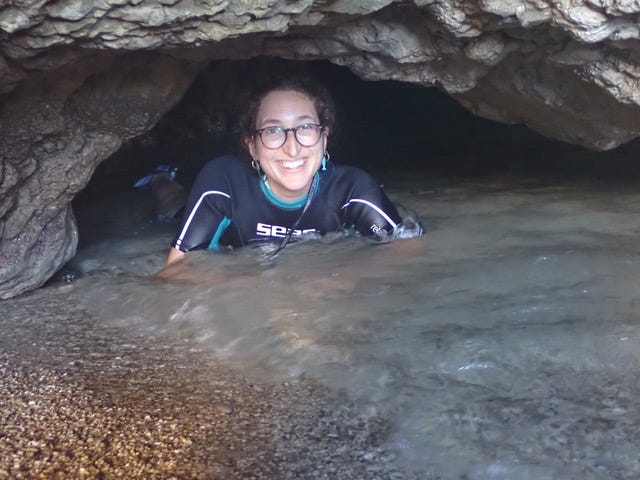
How do you describe the work you do?
I am a musician and an educator. I work with groups in workshop contexts and I perform as a solo player and—since just a few months!—as part of a collective, called Groovy Soup. The music I play is mostly for cello and voice, and I currently work for the Mus-e Foundation, which brings (no-cost) art workshops to public primary school students.
I’m passionate about wildlife conservation and ecology, and have been involved in conservation projects under different hats—as a volunteer, a research assistant and communication assistant for different foundations, an author and illustrator when co-writing an activity book for children about conservation, and as an artist when participating in conferences and collaborating with marine biology researchers in outreach projects through music composition and performance. Finally, I went back to university this year to fulfill an old dream—to be an ethologist and study animal behavior. So after years of traveling, I am enjoying settling down in a cozy town in northwestern Italy.
What aspect of your work has the most personal meaning for you?
I would say performing! I love the uniqueness of coming together with an audience and sharing music and words, being in the moment together. Every time is different, and I learn something new. There are so many kinds of connections when I perform in a club, on the streets, in the woods or by the sea, for children or grown-ups, or non-human life. It breathes new life into me and my repertoire, over and over again.
Also I love improvising, and trying to squeeze all that atmosphere and emotion of the moment into new pieces that are unique to the situation. Most of my music comes from this kind of process, so now a new piece feels actually “finished” in the moment I perform it.
Finally, being part of a collective such as Groovy Soup is opening up new possibilities. After being a solo performer for so long, I am deeply enjoying the diversity of multiple instruments and personalities coming together in performance! We improvise together using Santiago Vasquez’s method of Ritmo Con Senas, and it is a truly fun process to be part of.
How are science, art, and writing part of your work, and how is the interaction between these areas important to you?
I have been passionate about wildlife conservation since I was a child. Deciding to bring this into my music life has been a major shift! Since then the two have entwined in different ways.
My most recent work, “The Seal Suite,” was inspired by the work of Dr. Luigi Bundone and Aliki Panou in the conservation of Mediterranean Monk Seals. It started through stories of field research, and then—thanks to the support of Creature Conserve—through direct involvement in their work, as I got involved in data analysis training and then followed them in the field in Kefalonia, Greece. It was a truly incredible experience! Based on this, I composed a collection of pieces in the form of a semi-structured improvisation and participatory performance, loosely inspired by the classical genre of the Suite.
In other cases the relationship has been less direct: for example when writing with Claudia Cesarini the activity book for children “The EcoAdventures,” I got in touch with four different organizations conducting research on primates, Antarctic fauna, marine wildlife, and birds. I fact-checked the scientific side of the stories we wrote, and shared information about their work to inspire young readers.
Finally, my interest in bioacoustics has led me to learn about spectrograms! I started using them as a workshop tool to involve participants in synesthesia activities: translating sounds into shape and color, and then using the results to inspire improvised music. I also use my curiosity for bioacoustics to invent games and teach children about echolocation in marine mammals, and to introduce topics such as sound pollution in the ocean. So I guess I love jumping around different forms of interaction with science. And it still feels like I am just scratching the surface!
Is there a particular scientific or environmental problem that feels important to you? What do you do about that?
I feel passionate about some paradoxes that are emerging in our relationships with natural and “wild” spaces: the topic of access to wilderness as a source for well-being and the risk for habitats to be overrun with visitors; the ways we can be in nature and limit our impact, and still enjoy being there as part of the ecosystem and not just seeing ourselves as a source of disturbance. I am inspired by processes and initiatives of active care that start from local communities, representing their specific relationship with nature, and embracing diverse perspectives such as creative, scientific, and traditional/historic ones.
As for what I do about it, I am currently getting to know a new town, Turin, in the northwest of Italy—and its rivers! There are four rivers, with three points of confluence and loads of paths and cycleways by the water crossing the town. I am already quite attached to these spaces. A lot of people spend time there every day, and the areas are also full of birds, mammals, fishes, and insects—at this time of year, even fireflies! I’m reaching out to individuals and groups to imagine a possible event together, in a mixed form of workshop-interview-performance where different “river lovers” can meet and celebrate these spaces that make the town so magical. I am editing this post on a river right now. Have a look at the Po!
How does your identity affect your work?
Identity is revealing its mosaic-like nature more and more with time. It keeps defying uni-vocal definitions!
My passion for natural spaces and for wilderness as a space to heal and grow is definitely inspiring my work with groups, and my attempts to bring people together to share practices of care for lands and waters.
Having been trained in a very specific, strict culture and community (the classical music world) and then coming out of it, has left me skeptical of any absolute approaches, product-driven processes, and right/wrong dichotomies. So I’m always looking for diversified contexts, where multiple perspectives are welcome and can entwine in a non-violent and caring way.
My experience as a street artist keeps teaching me loads, for example being open to new encounters and the unexpected. I love receiving stories and insights from strangers; it has definitely given me a sweet tooth for listening.
All of these affect my interest in getting in touch with different disciplines, such as scientific research, and my work in education.
What influences and inspires you?
I may be a tad brainwashed by a very intense semester, but evolutionary theory feels quite exciting at the moment! Especially the concepts of spandrels, and the randomness of natural history. Spandrels are those elements in the physiology of an organism that have apparently no function; they are just casually there: a weird transcription, a duplicated gene, even the empty space left between two structures, and ta-da! There’s a spandrel. Then it can happen that they become useful for something, and from a random event they can completely change the history of a species!
They make me think of music improvisation: when something comes out differently from what you had planned, so a sort of “mistake,” you can use it—recycle it, turn it around and flip it over, have fun with it—until suddenly it makes perfect sense!
Other realities that I feel inspired by are small groups of people that work locally through participatory practices, bringing people together around nature, the sea, and music. Just to name a few: Salmastra in Catania (Sicily) Celacanto in Marina Serra (Apulia); Hoa Aina O Makaha in Oahu, Hawai’i; Collage Voices in Haringay London; and here in Turin, Radio Banda Larga (RBL), Via Baltea, Casa Barrito, and the Mus-e Foundation.
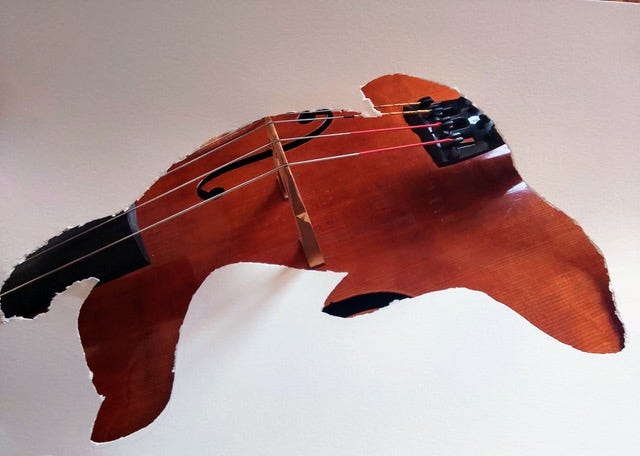
Are you interested in collaborating with other groups or individuals on science-art-writing projects? If so, what sorts of collaboration are you interested in, and what are you most excited to share?
Yes! I am wishing more and more for group projects and collaborations; I would love to bring together my passion for conservation and music as a social practice and put together a group of people to promote initiatives under this umbrella. At the same time, there are many associations that are already doing wonderful things here in Turin, so I will first explore what is already in place!
As a possible future science-art project, I am currently nerding out over bioacoustics, and I would love to explore this field through improvisation, maybe proposing a collaboration with research groups that study vocal communication in wild animals—for example, wolves!
As a solo project, I would love to collect narratives and stories about our relationships with diverse ecosystems, write songs about them, and travel with them. I am dreaming of a traveling project where I can finally embody the role of the minstrel, and travel from little town to little town sharing the songs and stories I got in touch with. Since at the moment I am quite stable in Turin (and also on a budget!) it would be fun to do so in the different districts of the town!
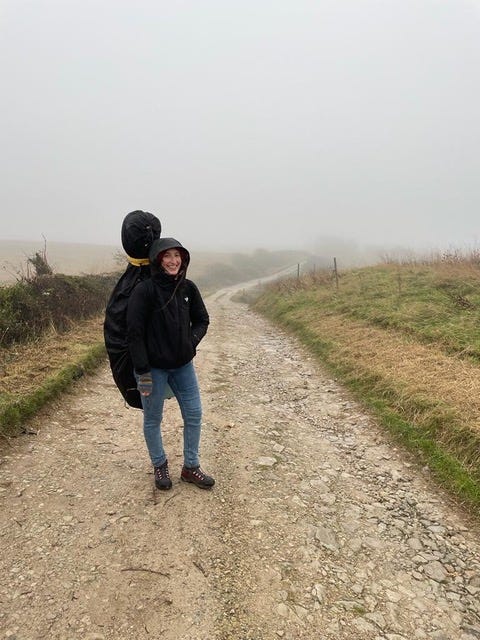
What's your favorite method or technique to learn something new? (from Kate Rutter)
I love learning with peers, in a context that encourages horizontal knowledge exchange. This comes quite naturally when learning by doing with others who are doing the same! It gives us the opportunity to deconstruct together the idea of “expertise” by sharing practices and insights in a non-hierarchichal, reciprocal way, and I find it awesome!
If you could have a day to hang out with anyone in history and geek out together, who would you choose, why, and what would you do together? (from Yvea Moore)
I would love to hang out with violinist and educator Yehudi Menuhin! He is the founder of the International Yehudi Menuhin Foundation, which has had a major role in my story since I finished my studies—training me, supporting me as an emerging songwriter, and now giving me a job through the Mus-e project.
Maestro Yehudi was an incredible virtuoso from the classical world, and he was the first of his kind to seek out collaborations with musicians of different cultures and musical traditions, playing together and contributing to open up the space for crossover collaborations that nowadays is home to so many of us. He also believed that music and art, in general, needed to be available to everyone in schools and that they would be the key for peaceful coexistence of different worldviews and practices. This inspired the project Mus-e, which gives work to artists all over Europe and brings art for free to public school students from five to eight years old. I would invite Maestro Yehudi for lunch and listen to his stories, and then invite him to come to a rehearsal of our collective, and jam together!
Anything else you’d like to tell us about?
I have been struggling with mood swings since I was 18, and this has had quite an influence on my composition and performance work. Playing, singing, and improvising root me back in the moment, and help me to let emotions flow through.
I am most grateful that I was surrounded by music as a child, thanks to my whole family and my mom in particular, who is a music educator; I remember sharing this passion with other children, friends, and my brother, playing together. I guess this is also the reason I live most of my music work as a thanks-giving—for an encounter, overcoming a challenge, learning something new, being surprised.
This is now flowing into my work as an educator, where I try to convey the message that we are all musicians at our core (as a species, we actually evolved this way!). So to those reading who have ever been told they are not musical, I apologize for my colleagues. That’s old school music education and it has done so much wrong. If you like music, please come make some. It will be fabulous to hear you sing or play your heart out, and there’s a community of people out here that you can do it with!
Thank you, Altea!
If you’d like to learn more about Altea and her work, you can visit her website or follow her on Instagram.




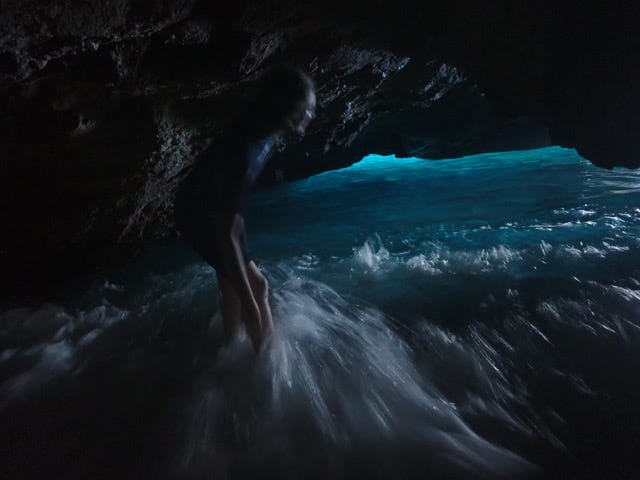
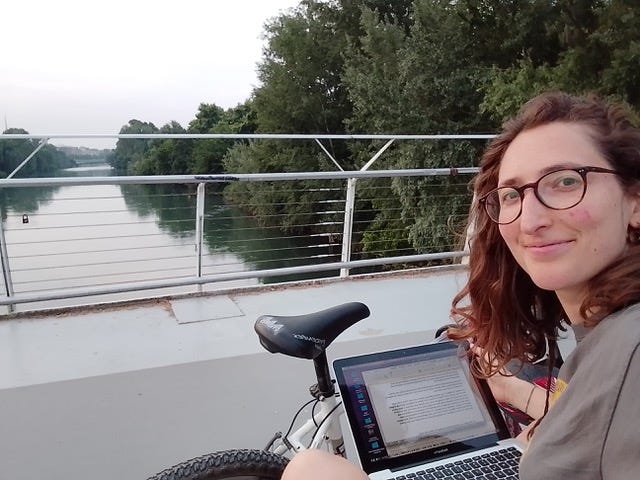
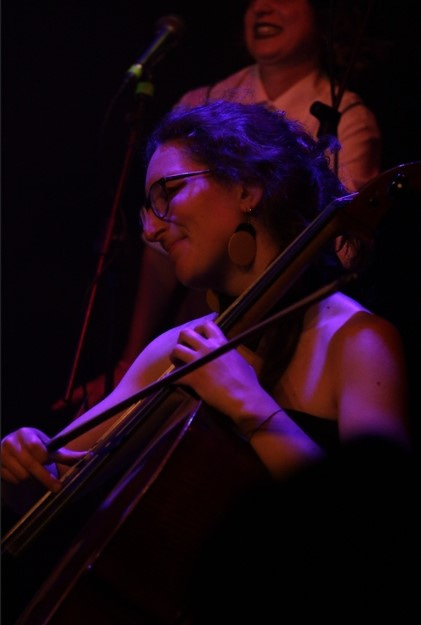
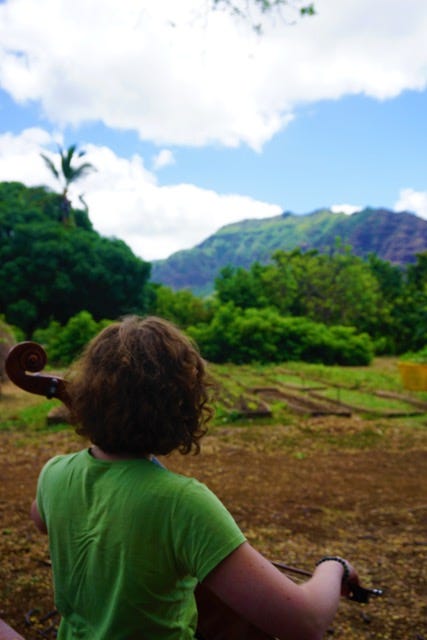
Altea Narici, Thank you. Your story, with all the bridges you have created is so important and inspiring for our world today and for me.
I love how you take the cello into cool, uncharted territories!